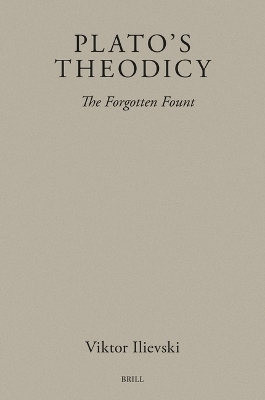
Plato's Theodicy
Brill (Verlag)
978-90-04-67929-0 (ISBN)
Ever since antiquity, the presence of evil has been considered incompatible with the existence of God. This apparent contradiction gave rise to the argument from evil, which turned into a formidable weapon against theism. Faced with this challenge, theists of all creeds have been proposing theodicies, or justifications of God’s ways.
This monograph is the first book-length treatment of the subject from a Platonic perspective. Its essential message is that Plato devised a noteworthy and influential theodicy comprised of several theodicean strategies, some of which remain relevant even today. Hence, Plato’s pioneering contribution to the field of theodicy deserves the attention of both philosophers and theologians.
Viktor Ilievski, Ph.D. (Central European University), is a Postdoctoral Researcher in Ancient Philosophy. He has been affiliated with the Autonomous University of Barcelona and the University of Bucharest. He publishes mostly in Platonic metaphysics, cosmology and theology, as well as on the problems of evil.
Acknowledgements
List of Abbreviations
Introduction
1 The Problem of Evil and Theodicy in Republic 379b–c
1.1 Traditional Religion’s First Profanation: Gods as Causes of Both Good and Evil
1.2 Plato’s Objections to Homer and Hesiod
1.3 Some Principles of Plato’s Theology
1.4 The Problem of Evil in Republic II
1.5 Does Plato Really Propose a Theodicy in Republic II?
1.6 Closing Remarks
2 Theodicy in Republic X: the Myth of Er
2.1 The Myth of Er: an Overview
2.2 The ??t?a ???µ????? ?e?? ??a?t??? Dictum
2.3 The Theodicean Significance of the Lottery Episode in the Myth of Er
2.4 ??t?a ???µ????: the Problem of Free Agency and Individual Moral Accountability
2.4.1 A Platonic Account of Freedom and Responsibility
2.4.2 The Challenge of Determinism
2.4.3 Infinite Regress of Accountability?
2.4.4 Further Objections Addressed
2.5 Closing Remarks
3 Theodicy in the Theaetetus?
3.1 Setting the Scene: the Theaetetus Digression
3.2 The Problem of Evil in the Theaetetus
3.2.1 The Status of t? ??a??? at 176a6
3.2.2 The Status of ?pe?a?t??? at 176a6
3.2.3 The Status of t? ?a?? and Their Relation to the ?pe?a?t???
3.2.4 The Status of ?????? at 176a6 and Its Relation to the ?pe?a?t???
3.2.5 ? ???t? f?s?? and the Evils
3.2.6 Further Reflections on ??????
3.3 Theodicy in the Theaetetus
3.3.1 Socrates and His God
3.3.2 Plato and the Soul-Making Theodicy
3.4 Closing Remarks
4 Theodicy in the Timaeus
4.1 Traditional Religion’s Second Profanation: Divine Envy
4.2 Plato’s Answer to the Second Profanation
4.2.1 The Concept of f????? in Plato’s Theology
4.2.2 Divine Goodness and the ‘Why a World at All?’ Question
4.3 Theodicy in the Timaeus
4.3.1 The Principle of Plenitude
4.3.2 The Solution from Personal Responsibility
4.3.3 A Factor Beyond God’s Control: Timaean Necessity
4.4 Personal Responsibility Abandoned?
4.5 Closing Remarks
5 Theodicy in Laws X
5.1 The Natural Theology of the Laws
5.2 Plato and the Aesthetic Theme
5.3 Inescapability of Divine Justice and Personal Responsibility
5.4 Closing Remarks
Conclusion
References
Index
| Erscheinungsdatum | 31.10.2023 |
|---|---|
| Reihe/Serie | Brill's Plato Studies Series ; 15 |
| Verlagsort | Leiden |
| Sprache | englisch |
| Maße | 155 x 235 mm |
| Gewicht | 501 g |
| Themenwelt | Geisteswissenschaften ► Philosophie ► Philosophie Altertum / Antike |
| Geisteswissenschaften ► Religion / Theologie | |
| ISBN-10 | 90-04-67929-4 / 9004679294 |
| ISBN-13 | 978-90-04-67929-0 / 9789004679290 |
| Zustand | Neuware |
| Haben Sie eine Frage zum Produkt? |
aus dem Bereich


